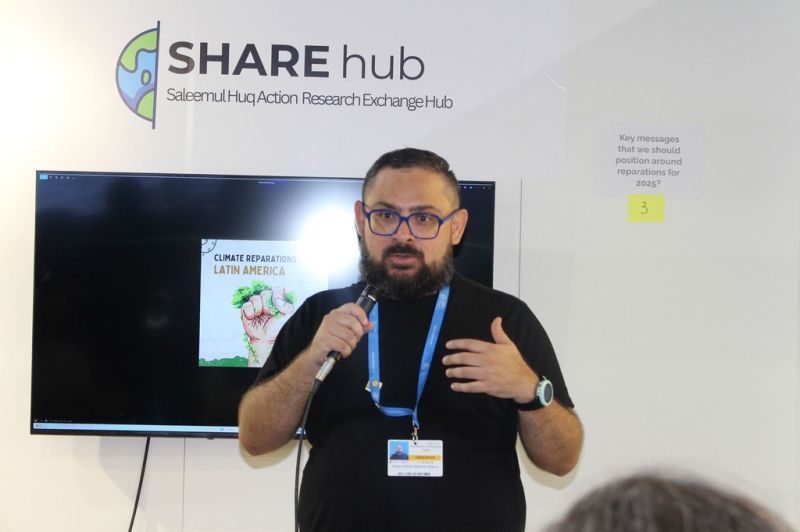
February 13 is World Radio Day. Ruta del Clima broadcasts indigenous voices and fights for climate justice Culture and Education
In the age of artificial intelligence and the ubiquity of social media, quality radio remains a versatile, popular and trusted medium. This year, World Radio Day, celebrated on February 13, celebrates the role of radio in raising awareness of climate change.
Costa Rica-based radio station Ruta del Clima uses the power of modern radio broadcasting to raise awareness and encourage public participation in climate decision-making in Latin America.
Radio as a Tool for Democratization
“Radio in all its forms, whether digital or transmitted via antennas, plays an incredibly important role because it democratizes access to information,” explains Adrian Martinez, director of Ruta del Clima. “Traditional radio reaches places and communities that don’t always have internet access. It’s also intergenerational. People interact with radio on a daily basis, its ephemeral nature makes it a particularly interesting format for transmitting information.”
People interact with radio on a daily basis, its ephemeral nature makes it a particularly interesting format for transmitting information
In an interview with the UN News Service, Martinez explains that Ruta del Clima studies and demonstrates the impact of climate change on the rights of vulnerable communities in Latin America, especially in central America, who bear little responsibility for climate change but are confronted daily with its devastating effects that alter their habitats and way of life.”
Ruta del Clima Radio, which aims to disseminate information and raise public awareness on climate issues, began in 2015 as a radio program that was broadcast in its early years by a university radio station in Costa Rica, before moving to digital format in the form of podcasts.
According to the project director, digital radio also creates valuable archive content that people can access at any time, which contributes to the “democratization of opinions and the expansion of perspectives.”

Adrian Martinez, director of the radio station Ruta del Clima.
Indigenous Voices
“The role of radio is especially important now that mass communication has become expensive and elitist. Traditional and digital radio offer the opportunity for communities, social organizations and movements to create their own platforms and make their voices heard,” says Adrian Martinez.
The role of radio is especially important now that mass communication has become expensive and elitist
UNESCO emphasizes that in addition to popularizing environmental concepts, radio, by providing verified information that is independent of economic, ideological and political interests, forms an understanding of climate change and its significance among listeners. This, in turn, allows radio to influence the public agenda and policy in this area.
The Link Between Society and Climate
Adrián Martínez notes that Radio Ruta del Clima is focused on establishing a connection between the problem of climate change and the audience not only in Costa Rica, but throughout Latin America.
“We discuss the most pressing aspects of climate change, highlighting the work, experiences and opinions of activists and experts from our region and other parts of the world. This is done so that people can get information beyond the official media. This allows them to have a more holistic view of what is happening and to be more involved in climate decision-making in their communities,” says Adrian Martinez.
In line with the SDGs
Ruta del Clima is well aware of the importance of the Sustainable Development Goals (SDGs), especially those related to climate action, peace and justice. Adrian Martinez notes that his NGO has collaborated with a number of UN agencies, such as UNICEF and UNDP.
“We work, for example, with the Office of the UN High Commissioner for Human Rights on climate change issues, and we regularly discuss these topics with representatives of the UN and the Organization of American States,” he explains.
Costa Rica is characterized by a high level of environmental awareness among both the population and government officials, and Ruta del Clima Radio has played a significant role in this.
A Unique Mission
“Our radio has a fairly wide audience, and this allows us to interact with technical experts from different countries, politicians, activists and representatives of foreign countries, with whom we discuss issues such as human rights, gender equality and local community issues,” says Adrian Martinez. – We are not a very big radio station, but we are unique in our mission.”
He emphasizes the importance of radio, which he says provides an opportunity to communicate orally, which is sometimes vital for understanding: “Oral communication is very different from written communication, and sometimes it is impossible to express ideas equally accurately in both formats.”
Radio makes ideas easier to understand and… helps focus on the main message
Unlike radio, social media creates a difficult environment for interaction and often becomes a platform for incitement to violence “Radio makes ideas easier to understand and does not contain the distractions that are typical of visual media like television or YouTube. “It helps us focus on the main message,” says Martinez.
On the eve of World Radio Day, he emphasizes: “Radio and communication media in general are vital for the exchange of ideas, emotions and feelings that can stimulate decisions that promote a harmonious relationship between man and the environment and the climate.”
